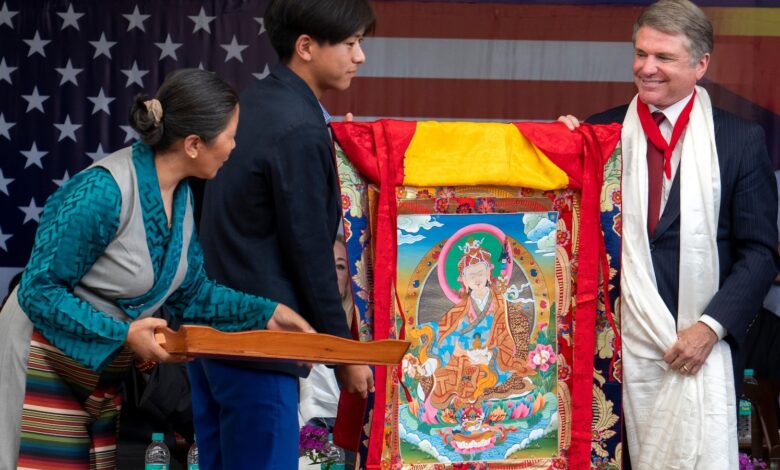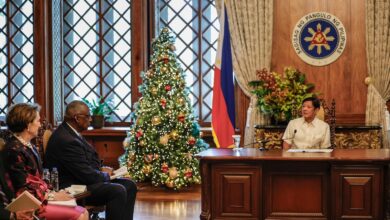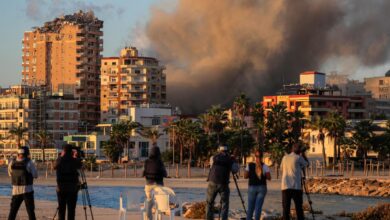US lawmakers meet with Dalai Lama in India’s Dharamshala, sparking anger from China

DHARAMSHALA, India — A bipartisan United States congressional delegation met with the Dalai Lama Wednesday at his residence in India’s Dharamshala, sparking anger from China which views the exiled spiritual leader of Tibetan Buddhism as a dangerous separatist.
This comes as Washington and Beijing have recently restarted talks after several years of turmoil that began after the imposition of tariffs on Chinese goods under the Trump administration. Relations at the time deteriorated even more following the COVID-19 pandemic and the rising military tensions in the South China Sea and the Taiwan Strait.
The high-level delegation, led by Republican Rep. Michael McCaul and including Democratic former House Speaker Nancy Pelosi, arrived Tuesday at the hillside town, which the Nobel Peace Prize laureate has made his headquarters since fleeing from Tibet after a failed uprising against Chinese rule in 1959. There, they met with officials from the Tibetan government-in-exile, which wants more autonomy for Tibet.
Beijing doesn’t recognize said administration and hasn’t held any dialogue with the representatives of the Dalai Lama since 2010.
After meeting the spiritual leader on Wednesday, the seven U.S. lawmakers addressed hundreds who had gathered at a monastery just outside the 88-year-old Dalai Lama’s residence, waving American and Tibetan flags.
They told the crowd that a key focus of their visit was to underscore the Resolve Tibet Act, passed by the U.S. Congress last week, and aims to encourage dialogue between the Dalai Lama and Chinese officials with the hopes of finding a peaceful resolution between Tibet and Beijing. The bill should now be sent to the White House for President Joe Biden to sign into a law.
Pelosi said the bill is “a message to the Chinese government that we have clarity in our thinking and our understanding of this issue of the freedom of Tibet,” eliciting applause.
McCaul, the Republican representative, said it reaffirmed American support for the Tibetan right to self-determination. “Just this week our delegation received a letter from the Chinese Communist Party, warning us not to come here… but we did not let the CCP intimidate us for we are here today,” he said as people cheered.
However, the visit and newly passed bill have triggered swift backlash from Beijing.
Lin Jian, a spokesperson for the Chinese foreign ministry, urged Washington on Tuesday not to support Tibetan independence and said the White House “must not sign the bill into law,” or China will take “resolute measures,” without elaborating on what they may be.
“It’s known by all that the 14th Dalai Lama is not a purely religious figure, but a political exile engaged in anti-China separatist activities under the cloak of religion,” Lin added, urging the U.S. side to “have no contact with the Dalai group in any form, and stop sending the wrong signal to the world.”
The Dalai Lama denies being a separatist and says he only advocates substantial autonomy and protection of Tibet’s native Buddhist culture.
The Tibetan spiritual leader has a history of engaging with U.S. officials, including American presidents — from Jimmy Carter to Barack Obama — except for Donald Trump. He has yet to meet Biden since he took office in 2021.
The Dalai Lama is expected to travel to the U.S. on Thursday for medical treatment for his knees, but it is unclear if he will meet any officials while there.
Meanwhile, Beijing has repeatedly asked the U.S. not to interfere with Tibetan affairs and has argued that the people of Tibet have enjoyed social stability and economic growth under its rule.
While India considers Tibet to be part of China, it hosts Tibetan exiles.
___
Associated Press writer Didi Tang in Washington contributed to this report. Pathi reported from New Delhi.






